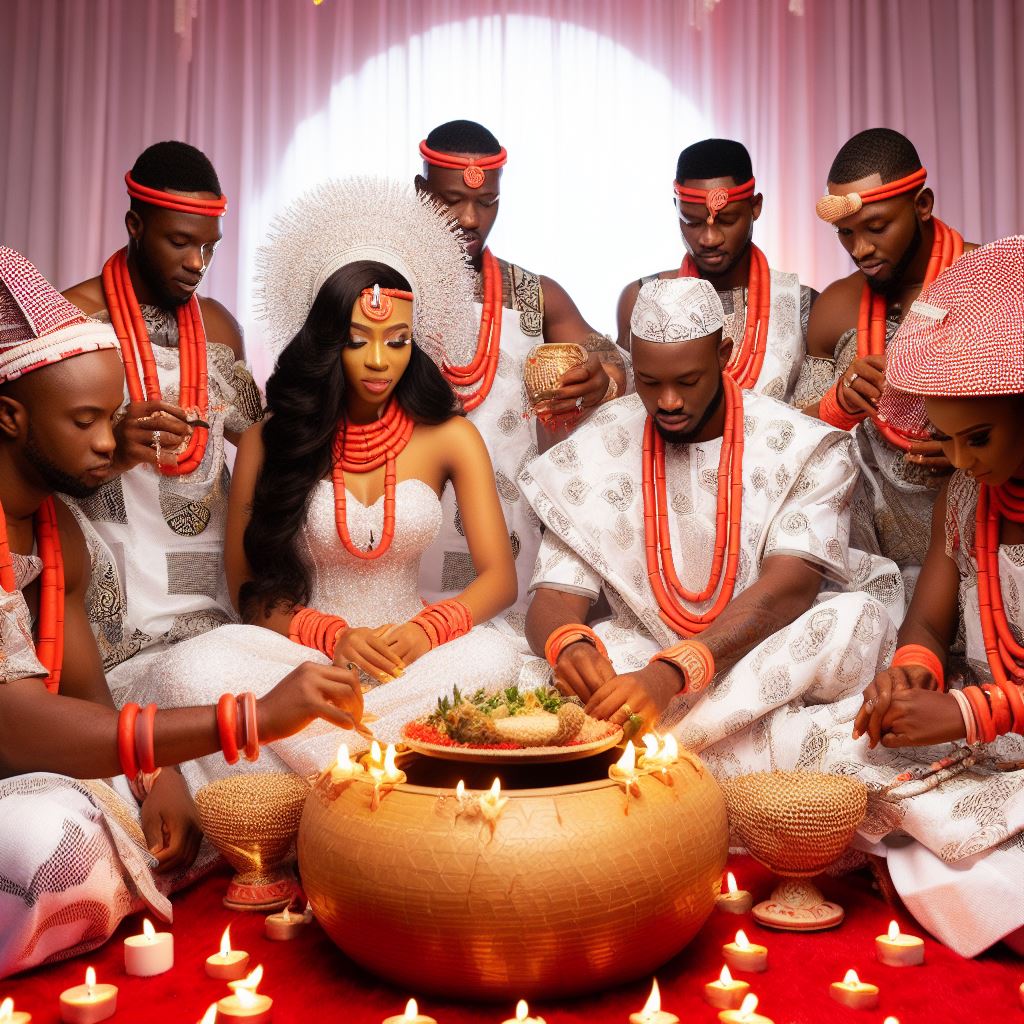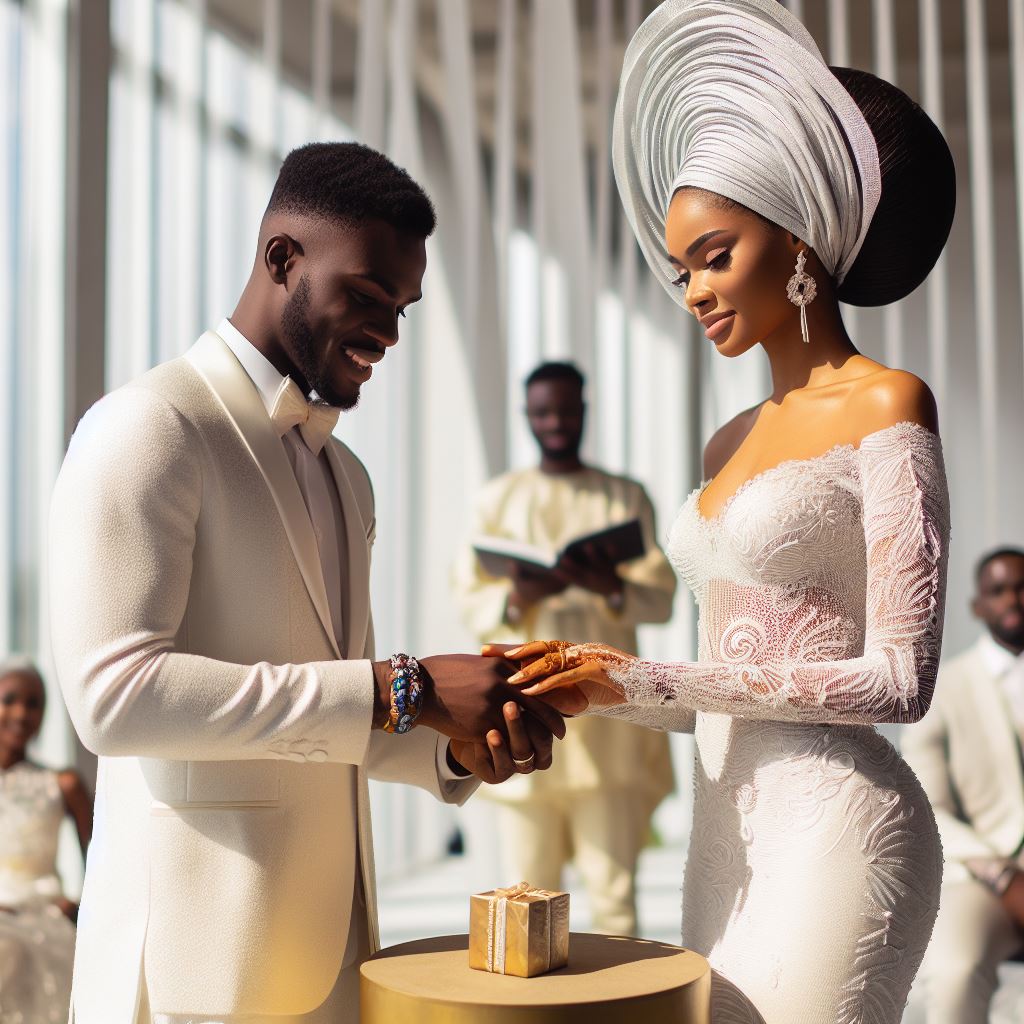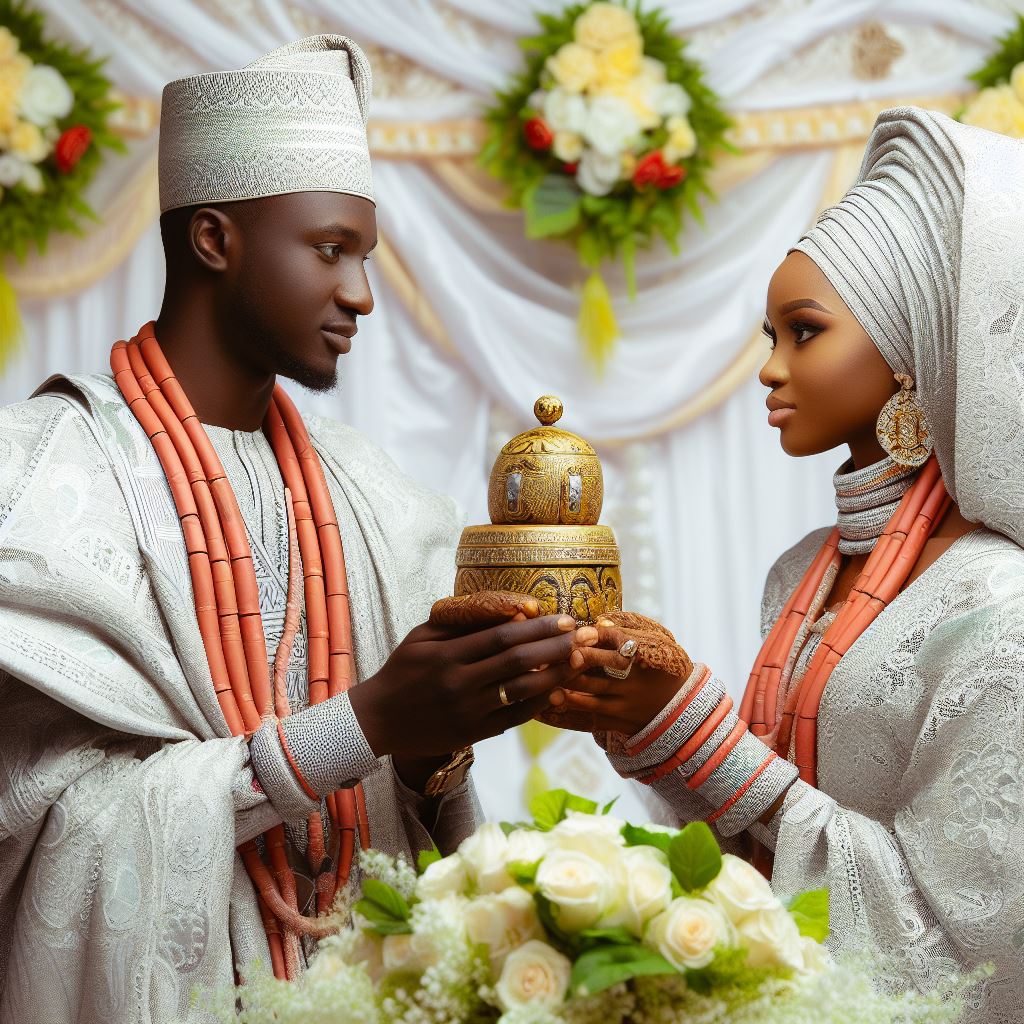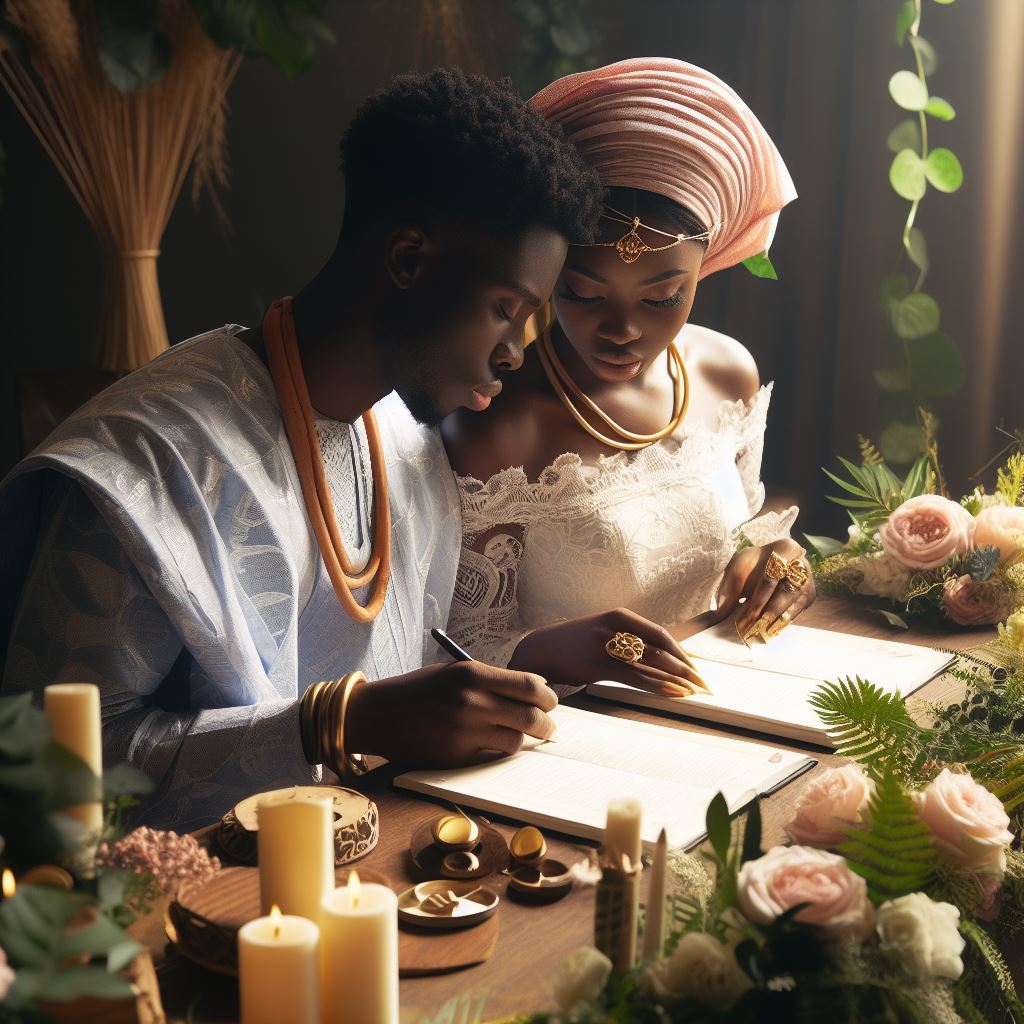Introduction
A. Igbo Wedding Ceremonies
Igbo wedding ceremonies are vibrant and steeped in tradition, reflecting the rich cultural heritage of the Igbo people.
B. Importance of Marriage in Igbo Culture
Marriage holds immense significance in Igbo culture, symbolizing unity, family, and continuity of traditions.
C. Preview of the Significance of Vows in Igbo Weddings
- Sacred Commitment: Vows represent a sacred promise between partners and their families, binding them in love and respect.
- Ancestral Connection: Vows honor ancestors, connecting the present and the past, reinforcing the importance of lineage.
- Community Witness: Vows are witnessed by the community, emphasizing the communal support and celebration of the union.
- Symbol of Trust: Through vows, couples affirm trust and fidelity, strengthening the foundation of their lifelong journey together.
In exploring Igbo wedding ceremonies, we delve into the profound promises that shape enduring unions.
Read: Addressing Common Marital Issues in the Nigerian Context
Traditional Igbo Wedding Customs
A. Introduction to traditional Igbo wedding rituals
In Igbo culture, wedding ceremonies are elaborate and sacred celebrations that hold deep cultural significance.
These customs are a display of the rich traditions and values embedded within the Igbo community.
B. Role of the groom in the ceremony
1. Groom’s family and their involvement
- The groom’s family plays a vital role in Igbo wedding ceremonies.
- They are responsible for initiating the marriage process and negotiating with the bride’s family.
2. Process of obtaining the bride’s consent
- Before the wedding can take place, the groom and his family must seek the consent of the bride’s family.
- This involves a series of visits and discussions to establish compatibility and agreement on the marriage.
3. Symbolism behind the groom’s arrival
- The groom’s arrival at the bride’s house signifies the official union of the two families.
- It is a moment filled with anticipation and excitement as the groom is welcomed by the bride’s family.
C. Role of the bride in the ceremony
1. Bride’s family and their involvement
- Similar to the groom’s family, the bride’s family plays an essential role in Igbo wedding ceremonies.
- They ensure that the bride is prepared for her marriage and provide guidance throughout the process.
2. Bride’s preparations for the wedding
- The bride undergoes extensive preparations for her wedding day.
- This includes traditional beauty treatments, such as the application of the “igbu nzu” (a special clay) to enhance her beauty.
3. Symbolism behind the bride’s attire
- The bride’s attire holds significant symbolism in Igbo wedding ceremonies.
- The intricate patterns and vibrant colors of her outfit represent her cultural heritage and identity.
Igbo wedding ceremonies continue to be cherished and preserved, as they serve as a testament to the cultural heritage of the Igbo people.
These rituals are a beautiful display of the values, beliefs, and traditions that form the foundation of Igbo weddings.
Read: The Role of Family in Strengthening Nigerian Marriages
Exchange of Vows
A. Significance of vows in Igbo culture
- The exchange of vows holds great importance in Igbo wedding ceremonies.
- Vows serve as a verbal contract between the couple, their families, and the community.
- They signify the commitment and promise made by the bride and groom to each other.
- Vows are seen as sacred words that bind the couple together in a lifelong union.
- They represent the foundation of a successful and harmonious marriage.
B. Understanding the traditional Igbo wedding vows
1. Importance of unity and togetherness in marriage
- The Igbo wedding vows emphasize the importance of unity and togetherness.
- Couples are encouraged to face challenges together and support each other unconditionally.
- Unity is seen as the key to a strong and enduring marriage in Igbo culture.
2. Promises made by the bride and groom
- The bride and groom make specific promises to each other during the exchange of vows.
- The groom promises to provide and protect his wife, ensuring her happiness and well-being.
- The bride promises to be a faithful and supportive wife, respecting and honoring her husband.
- These promises reflect the traditional gender roles and expectations within Igbo society.
3. Symbolism behind the exchange of vows
- The exchange of vows is accompanied by symbolic rituals in Igbo weddings.
- Breaking of kola nuts and sharing of palm wine symbolize peace, harmony, and fertility.
- The couple’s vows are witnessed by their families and elders, who offer blessings and guidance.
- The exchange of vows marks the official union of the couple and the start of their married life.
- It is a joyful and celebratory moment that is cherished by everyone present.
In fact, the exchange of vows in Igbo wedding ceremonies holds deep cultural significance.
It represents the commitment, unity, and promises made by the bride and groom to each other.
These vows serve as the foundation of a strong and enduring marriage, emphasizing the importance of togetherness, support, and respect.
The symbolic rituals accompanying the exchange of vows further enhance the meaning behind this sacred act.
As witnesses offer blessings and guidance, the couple embarks on their journey of building a happy and prosperous life together.
Read: Marriage Rituals & Traditions: A Deep Dive into Nigeria

You Might Also Like: Bridging Tradition: Nigerian vs. Western Wedding Wishes
Traditional Marriage Rites
Igbo wedding ceremonies deeply root traditional marriage rites in the customs and traditions of the Igbo people.
Families have passed down these rituals from generation to generation, and they hold a significant role in uniting two individuals.
A. Overview of traditional marriage rites
- Presentation of kola nuts: During the traditional Igbo wedding ceremony, the groom’s family presents kola nuts to the bride’s family.
This act symbolizes peace, unity, and acceptance of the groom’s family. - Exchange of gifts and dowry negotiations: Gift exchanges and dowry negotiations are an integral part of Igbo wedding ceremonies.
The groom’s family presents various gifts to the bride’s family, demonstrating their willingness to take care of the bride.
The dowry negotiations also signify the groom’s commitment to taking responsibility for his future wife. - Traditional blessings and prayers: The wedding ceremony is incomplete without traditional blessings and prayers.
Elders and spiritual leaders bless the couple and pray for a successful and fruitful marriage, emphasizing the importance of seeking the blessings of the ancestors.
B. Incorporation of Igbo cultural elements
- Traditional dances and music: Igbo wedding ceremonies are filled with vibrant traditional dances and music.
The energetic beats of drums, flutes, and other traditional musical instruments accompany the celebratory dances, creating an atmosphere of joy and festivity. - Traditional attire and accessories: The bride and groom adorn themselves in traditional Igbo attire and accessories.
The bride wears a beautifully embellished wrapper and blouse, complemented by intricate jewelry, while the groom dresses in a traditional attire consisting of a flowing robe and a cap.
These attires hold significant cultural symbolism and reflect the pride in one’s heritage. - Role of family and community members: Family and community members have active roles in Igbo wedding ceremonies. They serve as witnesses, advisors, and support systems for the couple.
Their presence and participation demonstrate the importance of community involvement and the unity of both families.
Overall, Igbo traditional marriage rites are not only about the union of two individuals but also a celebration of cultural identity, community, and ancestral blessings.
These rituals emphasize the deep-rooted values and customs of the Igbo people, ensuring the preservation and continuation of their heritage.
Read: The Cost and Duration to Get a Marriage Certificate
Gain More Insights: Nigerian Celebrity Proposals: Love Stories That Touched Us
Conclusion
A. Recap of the significance of vows in Igbo wedding ceremonies
Vows hold immense importance in Igbo wedding ceremonies, symbolizing the commitment, loyalty, and love between the couple.
B. Importance of preserving cultural traditions
Preserving cultural traditions, such as the exchange of vows, helps to strengthen the sense of identity and provides a connection to our roots.
C. Closing thoughts on the beauty and significance of Igbo weddings
Igbo weddings are not just a celebration of love but a display of rich cultural heritage and the deep-rooted values that make the Igbo people unique and united.
In review, the vows exchanged during Igbo wedding ceremonies serve as a promise and commitment within the presence of family and ancestors.
By preserving our cultural traditions, we uphold the essence of our identity and pass it on to future generations.
The beauty and significance of Igbo weddings go beyond the event itself, representing the bond between two souls and the unity of a community.




